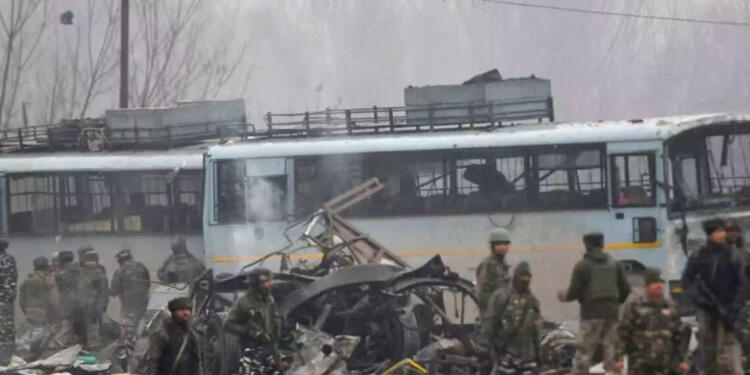February 14, 2019, is forever imprinted in the consciousness of Indians, as an anguishing day for the country. Thirty-four personnel were killed in a dastardly fidayeen attack in Pulwama district of Jammu and Kashmir by the terrorist group Jaish-e-Mohammed, operated from Pakistan. A convoy of 78 vehicles transporting more than 2,500 CRPF personnel was ambushed on National Highway 44 when a terrorist rammed an explosive-laden car into a bus carrying security forces. The devastating attack caused widespread sorrow and anger across the nation.
The Pulwama terror attack stands as one of the deadliest assaults in Kashmir’s history. It exposed the vulnerabilities of security convoys and the persistent threat posed by radicalized terrorists. The attack deeply affected the collective conscience of India, leaving citizens enraged and demanding justice for the fallen soldiers. It fundamentally changed the security landscape of the subcontinent.
Balakot Airstrikes: Retaliation by India
On 26 February 2019, the Indian armed forces carried out an overrunning military action just a day after the attack. A gallant strike with the Indian Air Force hitting deep inside Pakistani territory and targeting terror training camps in Balakot, in Khyber Pakhtunkhwa province, used by the JeM. The code name of the operation is ‘Operation Bandar.’ The two-seater Mirage 2000 fighter jets dropped Spice-2000 precision bombs equipped with penetrative warheads. These bombs hit JeM’s facilities, severely damaging the aspects inside while causing only a tiny collateral adverse impact. Reports were in circulation after this that over 300 terrorists were killed in the strikes, making India stand strong against terrorism.
The Balakot airstrikes were far more substantial than the 2016 surgical strike Following the Uri attack. Unlike the 2016 strikes that targeted terror launch pads in Pakistani-occupied Kashmir (PoK), the Balakot airstrikes transgressed the international border into Pakistan itself. This sent out a message to Pakistan That India was still cocked and ready to shoot”! Rocking the heavens off their feet in their terrorist infrastructure anywhere; his one point was so very much over the Line of Control (LoC).
A Watershed Moment in India’s Military Doctrine
The Pulwama attack and the subsequent Balakot airstrikes marked a watershed moment for India in terms of defence strategy. It was self-evident that no terror attack would go unpunished. The new doctrine was characterized by pre-emptive and punitive strikes, so that terror groups, and their controllers in Pakistan, had to face dire consequences for their actions. The attack also led to significant military reforms, including the formation of Integrated Battle Groups (IBGs) and the appointment of India’s first Chief of Defence Staff (CDS), reinforcing India’s ability to respond swiftly to future threats.
India’s approach mirrors Israel’s counterterrorism strategy, which focuses on deep-strike capabilities and deterrence. Much like Israel’s response to terrorist threats, India has adopted an aggressive stance, ensuring that terror outfits operating within Pakistan’s borders are held accountable. The Balakot airstrikes demonstrated India’s willingness to escalate military action beyond previous limitations, fundamentally altering Pakistan’s calculations.
The Legacy of Pulwama
Today, a tribute is paid by the whole of India to the 40 valiant soldiers of the CRPF who lost their lives for the country. Their sacrifice was not in vain; they ushered a paradigm shift in India’s national security policy. On the other hand, Pakistan has incurred a severe blow, with Indian retaliation having utterly exploded Pakistan’s delusions of impunity. The message is loud and clear: any acts of terror will be met with severe, unfettered retaliation.
February 14 remains one such day of reflection to honor not only our fallen heroes but the undying spirit of India. The attack served as a dark blot on the escutcheon of history, but it also stood witness to the awakening of a new dawn in India’s fight against terror. They will forever be remembered for their ultimate sacrifice in the fight against terrorism, a cause that cemented India’s resolve to get rid of it- with grim determination.

























